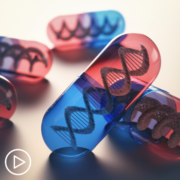Could Statins Help Fight Prostate Cancer?
Could Statins Help Fight Prostate Cancer? from Patient Empowerment Network on Vimeo.
Could prostate cancer patients benefit from the use of statins? Expert Dr. Tanya Dorff explains recent interest in the benefits of this cholesterol-lowering medication and discusses their potential impact on the effects of androgen deprivation therapy.
Related Resources:

|

|

|
Transcript:
Katherine:
Antonio had this question. “I heard that statins – cholesterol-lowering drugs – could help fight prostate cancer. Is that true?”
Dr. Dorff:
There’s been a lot of interest in the statins because in addition to having those positive effects against cholesterol, which are helpful when hormonal therapy that we use for prostate cancer disrupts our lipids, they have these anti-inflammatory properties that are being looked at in a number of different research avenues.
And then, there has also been a new, evolving understanding that they interfere with some hormone-binding compounds in the body, and so, could augment the effect of androgen deprivation therapy.
So, there has been interest in prospective studies because the literature we have right now is really retrospective, so we can’t really tell a patient which statin drug or what dose and for how long would be associated with a positive benefit, and we don’t really yet know how to use them proactively during someone’s treatment. But I will say if you’re starting on hormone therapy or ADT, having your lipids checked and getting on a statin if your lipids are not in a good range is really important anyway to just protect your cardiovascular health, and then, maybe we’ll find out that it does actually help your prostate cancer treatment be more successful as well, but I would say those data still need to be fleshed out a bit more.



